Bibliothèque
Toutes les ressources
2041 – 2060 sur 2622 résultats
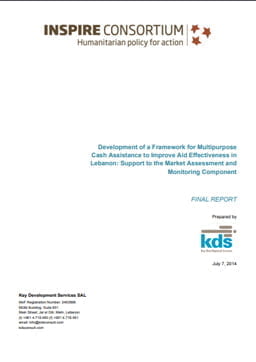
Development of a Framework for Multipurpose Cash Assistance to Improve Aid Effectiveness in Lebanon: Support to the Market Assessment and Monitoring Component
Report
The objective of the three market assessments presented in this report is to provide the interagency cash transfer programming working group (CTPWG) with meaningful and actionable information on the market impact of cash assistance in Lebanon. This report is also intended to inform decision making on...
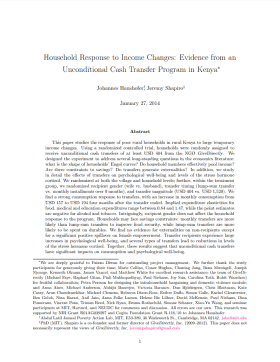
Household Response to Income Changes: Evidence from an unconditional cash transfer program in Kenya
Report
This paper studies the response of poor rural households in rural Kenya to large temporary income changes. Using a randomized controlled trial, households were randomly assigned to receive unconditional cash transfers of at least USD 404 from the NGO GiveDirectly. We designed the experiment to address...
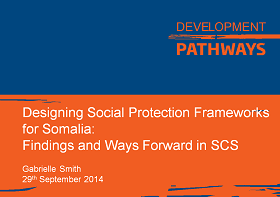
Designing Social Protection Frameworks for Somalia: Findings and Ways Forward in SCS
Report
This presentation was made on behalf of Development Pathways at the social protection framework validation meeting that took place at the Jacaranda Hotel in Nairobi, Kenya on 26 September 2014. It looks at designing social protection frameworks for Somalia and covers: 1.Activities and Methods 2.Macro...
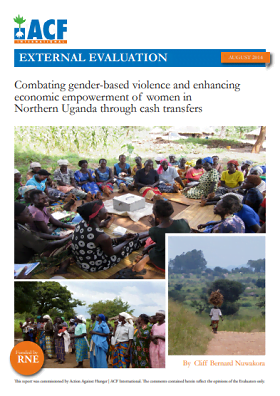
Combating gender-based violence and enhancing economic empowerment of women in Northern Uganda through cash transfers
Report
The aim of this evaluation is to assess the relevance, sustainability, effectiveness and efficiency of the programme. Moreover, the evaluation will assess the impact of the programme on women and girls in relation to livelihoods and economic empowerment and access to social services, including education,...

Etude de faisabilité pour un programme de transferts sociaux monétaires comme instrument majeur d’une protection sociale centrée sur l’enfant au sénégal
Rapport
Les subventions et autres mesures politiques adoptées par le gouvernement en 2007 pour protéger les pauvres des effets néfastes induits par le prix élevé des denrées alimentaires et du carburant se sont révélées très onéreuses et pourtant inefficaces pour atteindre les plus pauvres. La...

Les programmes de transfert monetaire sont-ils prêts pour l’avenir? – Rapport final
Rapport
Le présent rapport expose les résultats d’un travail de recherche de 2013 intitulé Les programmes de transfert monétaire sont-ils prêts pour l’avenir ? Cette recherche a été commandée par le Cash Learning Partnership (the CALP Network) et menée par le Humanitarian Futures Programme (HFP),...
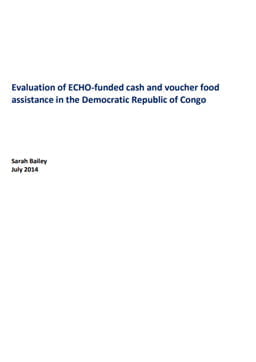
Evaluation of ECHO-Funded Cash and Voucher Food Assistance in the Democratic Republic of Congo
Report
People in eastern Democratic Republic of Congo (DRC) have long faced protracted conflict and instability resulting in the displacement of populations. In order to provide households affected by new displacements with timely access to food, ECHO funded the Norwegian Refugee Council (NRC), the Association...
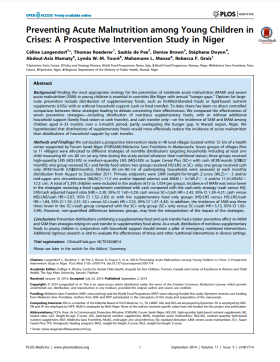
Preventing Acute Malnutrition Among Young Children in Crises: A prospective intervention study in Niger
Report
Governments and donor agencies need to know which preventative strategy is most effective, particularly among children under 2 years old who are most vulnerable to acute malnutrition. Here, the researchers compare the effectiveness of seven preventative strategies—including the distribution of...

Guidelines for Conditional Cash-for Rent Assistance for Syrian Refugees in Jordan
Guidelines and Tools
The objective of these guidelines is to inform Shelter sector partners of best practices for implementing conditional cash-for-rent assistance targeting Syrian refugees in the host communities. These guidelines have been developed by a taskforce of the Shelter Working Group.

Humanitarianism in the Age of Cyber-warfare: Towards the Principled and Secure Use of Information in Humanitarian Emergencies
Report
Humanitarian assistance is driven by information. From early warnings to needs assessments to final evaluations, information determines priorities and resource allocation. In addition, a crisis drives people to collect and share personal information that they otherwise wouldn’t: the names of missing...
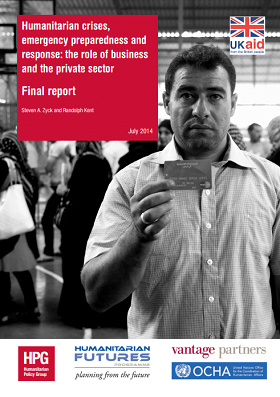
Humanitarian crises, emergency preparedness and response: The roles of business and the private sector – final report and case studies from Indonesia, Kenya, Jordan and Haiti
Report
The private sector has long been a major contributor to humanitarian action. At the community level, businesses frequently use their materials and resources to aid people affected by crises. As local markets recover and supply chains are repaired, crisis-affected people are once again able to access basic...

Les outils du CALP Network: vue d’ensemble
Guides et outils
Ce document présente les principaux outils développés par le CALP Network afin de soutenir la communauté de pratique dans l’apprentissage, le partage d’informations et les discussions sur des sujets relatifs aux transferts monétaires.
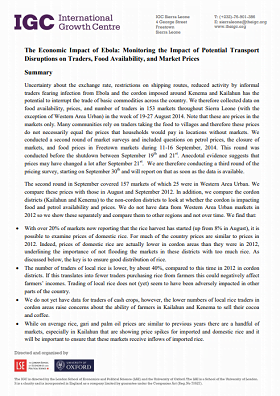
The Economic Impact of Ebola: Monitoring the Impact of Potential Transport Disruptions on Traders, Food Availability, and Market Prices
Report
Uncertainty about the exchange rate, restrictions on shipping routes, reduced activity by informal traders fearing infection from Ebola and the cordon imposed around Kenema and Kailahun has the potential to interrupt the trade of basic commodities across the country. We therefore collected data on food...
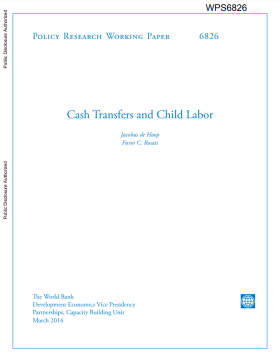
Cash Transfers and Child Labor
Policy paper
Cash transfer programs are widely used in settings where child labor is prevalent. Although many of these programs are explicitly implemented to improve children’s welfare, in theory their impact on child labor is undetermined. This paper systematically reviews the empirical evidence on the impact of...

Les transferts monétaires dans les situations d’urgence urbaine – Boîte à outils destinées aux praticiens
Guides et outils
Reconnaissant la croissance de la population urbaine dans le monde et leur vulnérabilité croissante aux catastrophes, le CALP Network se propose d’examiner l’état actuel et l’impact des programmes d’intervention en milieu urbain faisant appel aux transferts monétaires. Cette étude vise...
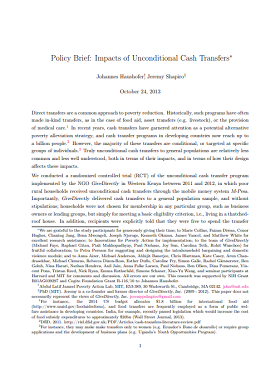
Policy Brief: Impacts of Unconditional Cash Transfers
Policy paper
This policy paper looks at a randomized controlled trial (RCT) of the unconditional cash transfer program implemented by the NGO GiveDirectly in Western Kenya between 2011 and 2012, in which poor rural households received unconditional cash transfers through the mobile money system M-Pesa. Importantly,...
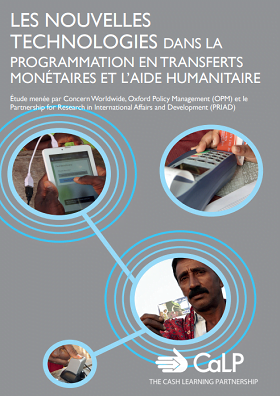
Les nouvelles technologies dans la programmation en transferts monétaires et l’aide humanitaire
Report
Le CALP Network a chargé Concern Worldwide de diriger un consortium également constitué d’Oxford Policy Management (OPM) et de Partnership for Research in International Affairs and Development (PRIAD) afin d’analyser l’utilisation actuelle des nouvelles technologies appliquées aux programmes...

Directives pour la mise en oeuvre de transferts électroniques en situation d’urgence
Rapport
Les transferts électroniques sont une forme de transfert de valeurs qui s’appuient sur des systèmes de paiement numérique. Les très nombreux avantages que peuvent conférer ces transferts aux bénéficiaires aussi bien qu’aux organisations d’aide humanitaire ont été abondamment documentés....
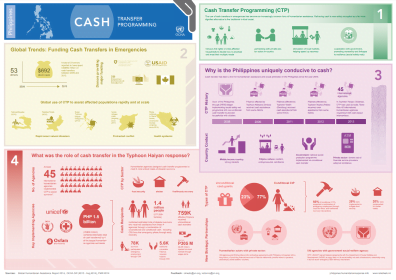
Cash Transfer Programming Infographic – OCHA
Presentation
OCHA (Office for the Coordination of Humanitarian Affairs) in the Philippines has produced a helpful infographic explaining the role of cash transfer programming in the Philippines Typhoon Haiyan response. The infographic explores several aspects of cash transfer programming, and examines the several...
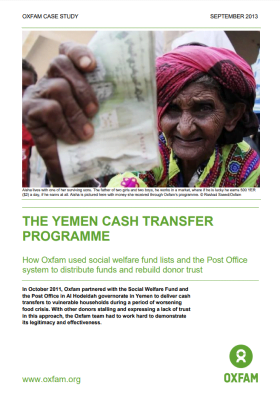
The Yemen Cash Transfer Programme
Report
This case study shows how Oxfam used social welfare fund lists and the Post Office system to distribute funds and rebuild donor trust. In October 2011, Oxfam partnered with the Social Welfare Fund and the Post Office in Al Hodeidah governorate in Yemen to deliver cash transfers to vulnerable households...